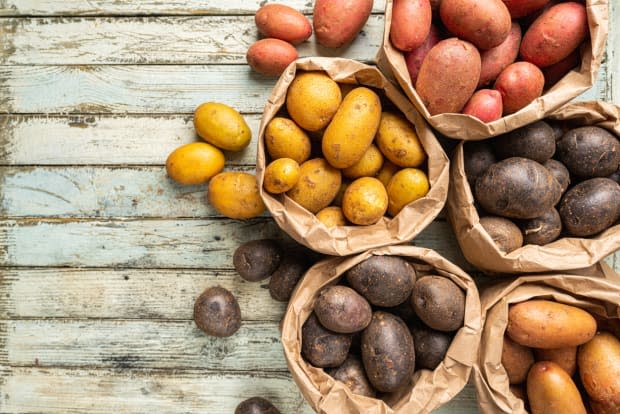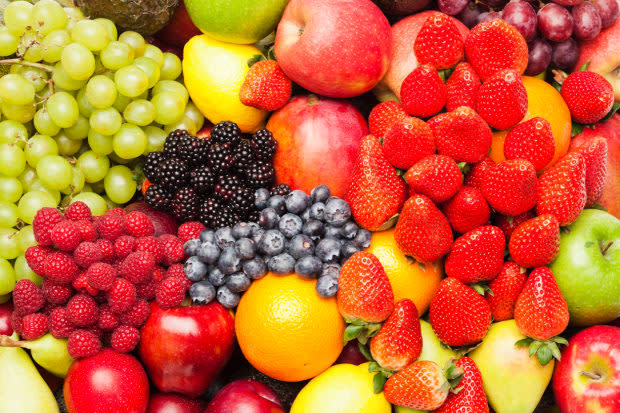6 Carbohydrates Dietitians Wish People Ate More Of
Dietitians explain why carbs are important and which ones are healthy to eat.
For many people trying to lose weight, foods high in carbohydrates are often the first to be nixed from their diet. Burgers are eaten without the bun, a side of roasted potatoes is replaced with broccoli, the bread basket goes untouched.
While it can be beneficial to be mindful of carb intake when you’re trying to lose weight, registered dietitians say that it’s a major myth that carbs are “bad” or should be cut out completely. “Carbohydrates are the body's primary source of energy and provide the fuel for muscles and various organs,” says registered dietitian Jamie Lee McIntyre, RDN. The key is knowing which carbs pack the most nutritional goodness; not all carbs are created equal. And while it’s always best to eat a variety of foods to get a wide range of vitamins and nutrients, there are some carbohydrate-filled foods in particular that can be especially beneficial.
How Carbs Fit Into a Healthy Diet
According to registered dietitian Anne Danahy, RD, the reason why carbs often get a bad rap is because most people equate carbs with refined, sugar-filled foods with little nutrient value, such as pastries and chips.
“Refined carbohydrate foods like desserts, pastries, sweetened soft drinks or sweetened cereals can give you a quick burst of energy because your body breaks them down and releases the glucose quickly. The problem with those foods is that after the energy burst, you tend to crash,” Danahy explains. “Most people reach for more refined carbs for another energy boost, so they get caught in a vicious cycle and end up eating too many calories, often from foods that aren’t very nutritious.”
Danahy explains that this is completely different from how complex carbohydrates affect the body. She says that complex carbohydrates take longer to digest, so they provide long-lasting energy. “Complex carbs tend to have more vitamins, minerals and fiber too, so they’re healthier all around,” she says.
While complex carbs are more nutrient-rich, McIntryre says that all types of carbohydrates can be beneficial to include in one’s diet. She recommends aiming for between 45 and 65 percent of calories to come from carbohydrates. “Ideally, you should try to eat small amounts of complex carbs every few hours—at each meal and snack—to maintain your energy throughout the day,” Danahy adds. Remember, carbs are the body’s preferred source of energy. Because of this, Danahy says that not eating enough can lead to feeling fatigued, having trouble concentrating and even feeling shaky.
Related: Feeling Sluggish? Experts Say That These 58 Natural Foods Will Give You an Energy Boost
Carbohydrates Dietitians Want Everyone To Eat More Of
One major reason why both dietitians say that cutting out carbs completely is a mistake is that many carb-based foods have other beneficial nutrients you would be missing out on. There are six types of carbohydrates in particular that they say are especially nutrient-rich, listed below:
1. Beans and legumes
Both Danahy and McIntyre say that beans and legumes are a powerhouse of nutrient density. In addition to carbohydrates, they are an excellent source of both protein and fiber. “They’re also super versatile,” Danahy says. To her point, there are so many different types of beans and legumes as well as endless ways to incorporate them into meals. Plus, they're affordable and can be stored for months in your pantry.
Related: Why Beans Are Great for Longevity—Plus 9 Other Foods Linked To Lengthening Lifespan
2. Oats
If you want to eat more foods that support both gut and heart health, oats are a good one to prioritize. “Oats are a carbohydrate that contains beta glucan, a soluble fiber that may help lower cholesterol levels, help manage blood glucose control, and support immune health,” McIntyre says. Like beans, oats also have fiber, which helps support the digestive system.
3. Barley
“Barley is packed with soluble fiber, which helps balance blood sugar and reduce cholesterol,” Danahy says as to why it's one of her favorite sources of carbohydrates. She adds that barley is low-glycemic, so it breaks down slowly and won’t spike blood sugar levels. Not sure how to eat it? Enjoy it as a side dish or in soups and stews.

iStock
4. Starchy veggies
Potatoes, sweet potatoes corn, beets, peas, squash…Both dietitians say that starchy vegetables like these are full of important nutrients in addition to carbohydrates such as fiber and antioxidants. Need more convincing for keeping them in your diet? Consider this: Sweet potatoes are a staple for people in Okinawa, Japan, a “Blue Zone,” where people regularly live to be over 100 in good health.

iStock
5. Fruit
Cutting carbs out of your life would mean missing out on the abundant benefits found in fruit. McIntyre says that fruit is full of fiber and antioxidants, which are especially good for both brain and heart health. “The vitamins found in fruit are also needed for digestion and immune function,” she adds.
6. Dairy
“Dairy foods, like yogurt and milk, are an important source of protein, calcium and vitamin D which support bone density, growth, development and overall health,” says McIntyre. She adds that lactose—the naturally-occurring carbohydrate found in milk and yogurt—is paired with protein and fluids, which makes it a perfect post-workout drink because it replenishes energy stores while providing amino acids for muscle repair and recovery, with liquid and electrolytes for hydration.
Danahy also recommends dairy foods and drinks and is particularly a fan of kefir, which is rich in probiotics that support gut health. “Kefir also provides protein along with carbs, so it’s nicely balanced,” she says.
Carbohydrates are an important nutrient that the body depends on for energy. Besides being key for overall health, foods with carbohydrates are delicious! Why give up foods like oatmeal topped with blackberries, white bean chili and roasted garlic potatoes if you don’t have to? Simply put, life is better—and healthier—with carbs.
Next up, see a list of 20 heart-healthy snacks that are registered dietitian-approved.
Sources
Jamie Lee McIntyre, RDN, registered dietitian, nutrition communicator and consultant
Anne Danahy, RD, registered dietitian and owner of Craving Something Healthy